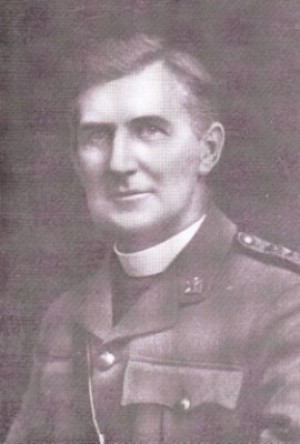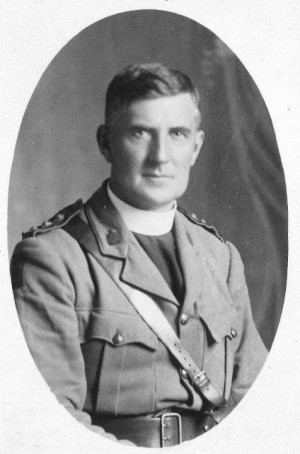Service Details
- Branch of Service
- Army
- Conflict
- World War I (1914-1918)
- Date of Enlistment
- 04/10/1915
- Date of Discharge
- 02/01/1918
- Place of Enlistment
- Sydney NSW
Personal Details
- Gender
- Male
- Date of Birth
- 22/03/1876
- Place of Birth
- Acton, Middlesex, England
- Address (at enlistment)
- The Rectory, Canberra ACT
- Occupation
- Clergyman
- Next of Kin
- Archdeacon John Ward (brother), The Rectory, Cooma NSW
Unit and Rank Details
- Service Number
- 1741
- Final Rank
- Captain
- Final Unit
- 30 Battalion AIF
Commemoration
Queanbeyan RSL Wall of Remembrance, Crawford St, Queanbeyan NSW
Awards and Honours
Military Cross awarded 18 April 1918 (Commonwealth of Australia No.169, page 847, position 139). According to his citation he established a soup kitchen at Delville Wood in the Somme in February 1917, then at Bapaume shortly after its capture in March 1917 and later at Beugny. He continued to operate his soup kitchen despite being "constantly under heavy shell fire".
Mentioned in Despatches awarded 4 October 1917 (Commonwealth of Australia No.169, page 2625, position 138)
Notes
The Reverend Fred Ward was born in Acton, England in 1876, the son of John and Elizabeth Ward. He was rector at St. John the Baptist Church of England from 1913 until 1929. He came to Australia around the turn of the century and commenced his theological studies at Bishop's College in Goulburn where he was made a deacon in 1905. He worked in parishes at Wagga Wagga, Temora and Barmedman before arriving in Canberra. In September 1915 Ward was part of the funeral service for Sir William Throsby Bridges, a former parishioner when he was commandant of the Royal Military College, at St. John's Church. After enlisting in October 1915, Ward was given a travelling chalice and paten by his parishioners. He served as a Chaplain 4th Class attached to the 32nd Battalion in Egypt and with the 8th Brigade in France and Belgium from June 1916 until September 1917. He was described by one of the men as "bright - men have a great down on dopes; he is sincere - men soon detect unreality; he is enthusiastic - men like a man who means business. He thinks of the physical; knows that a good feed does more good than a sermon at times; he realises that men are human, and will have sport. The boys know his worth and trust him." According to Stanley, in 1917 he toured AIF camps in Britain and the Western Front delivering lectures enjoining soldiers to continence. He told troops that "any man who deliberately satisfies his own animal lust and robs a girl of her greatest possession - her purity - was, he swore, a 'bloody skunk'", although Ward's grandson believes that the reference is to Fred's brother John who also served as a chaplain during the war. On 9 May 1917 Ward received special mention in Sir Douglas Haig's despatches and was awarded the Military Cross in 1918 for his work in running a soup kitchen at Delville Wood, Bapaume and Beugny despite being "constantly under heavy shell fire". He was presented with the Military Cross at a ceremony held on the parade ground at RMC in April 1919.
He returned to Australia in November 1917 and his appointment was terminated due to medical unfitness. He married Margery Towle on 28 January 1918 in New Zealand and then resumed his duties at St. John's. In 1929 Canon Ward and his family left for England. They lived at Southwark, where he was the incumbent at Christ Church Brockham Green (1929-36), then in Docking in Norfolk (1936-50) and finally as curate-in-charge sequestration at Bagthorpe near Norwich (1950-56). He died at Norwich Hospital on 7 February 1963. Fred Ward Gardens retirement village in Curtin is named in his honour. His son Edwin, who was born in Canberra in 1919, also entered into Holy Orders and served as Chaplain to the Queen (1955-89).
Description - height 5 feet 11 inches, weight 192 pounds, chest 40-43 inches, Church of England.
Sources
Alfred Body, 'Firm Still You Stand', 1986 (pp. 109-149)
Eddie Braggett, 'Camps Settlements and Churches', 2010
Peter Stanley, 'Bad Characters - Sex, Crime, Mutiny, Murder and the Australian Imperial Force', 2010 (p.117)
Cable Clerical Index (Project Canterbury) - http://anglicanhistory.org/aus/cci/
AWM Honours & Awards
AWM Collections Record : PR85/375
National Library of Australia: Country Women's Association of NSW (Canberra Branch) History, 1959 (manuscript call no. NLA MS 734)
Queanbeyan Age - 30 November 1917, 22 January 1918, 1 February 1918, 26 February 1918, 8 April 1919, 4 November 1919
Queanbeyan Observer - 6 September 1915
The Canberra Times - 1 October 1926
Sydney Mail - 16 April 1919
NAA RecordSearch - Series B2455 (First Australian Imperial Force Personnel Dossiers, 1914-1920)
Stories from the ACT Memorial, 'When the dog barked', ACT Heritage Library www.library.act.gov.au/find/history/stories_from_the_act_memorial
Information and image provided by Simon Ward (grandson)

